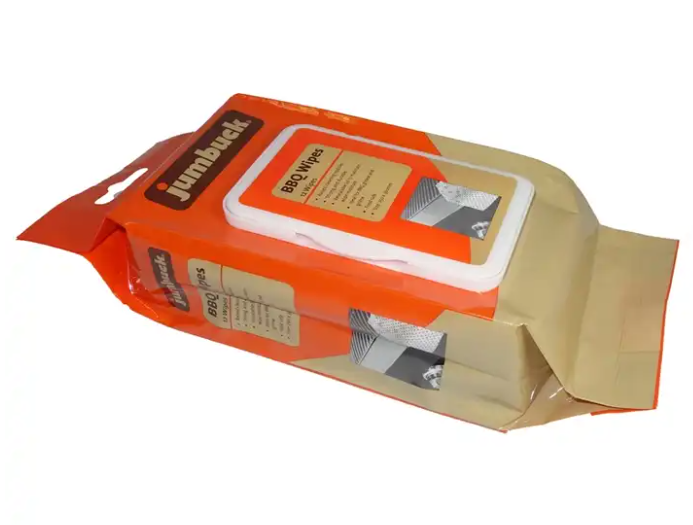ペースの速い現代社会において、キッチンの衛生と清潔さは、健康維持のためだけでなく、日常生活の利便性を向上させるためにも欠かせないものとなっている。キッチン・ワイプは、クリーニング・ワイプや除菌ワイプとしても知られ、家庭用・業務用を問わず、キッチンのカウンタートップや電化製品、調理器具を洗浄するための一般的なツールとなっている。これらの使い捨てワイプは、従来の清掃用品の必要性を減らしながら、清潔さを維持するための迅速かつ効果的な方法を提供します。キッチンワイプの需要が世界的に伸び続ける中、その用途や加工技術、信頼できるサプライヤーと協力するメリットを理解することは、これまで以上に重要になっている。
で 紫月バイオテクノロジー当社は、消費者と企業のニーズを満たす高品質のキッチンワイプの製造に特化しています。技術革新、研究開発、費用対効果の高いソリューションに重点を置き、当社の製品は性能と利便性の完璧なバランスを提供しています。この記事では、キッチンワイプの用途、製造に使用される加工技術、クリーニング製品のニーズに合ったサプライヤーやOEM/ODMパートナーを選ぶメリットについてご紹介します。
キッチンワイプの用途
キッチンワイプは、その多用途性、利便性、有効性から、家庭用・業務用両方の厨房で広く使用されている。ここでは、キッチンワイプの主な用途をご紹介します:
1.ホームキッチン
家庭のキッチンでは、食品を衛生的な環境で調理するために掃除が欠かせない。キッチン・ワイプは、カウンタートップ、コンロ、冷蔵庫、まな板などの表面を素早くきれいにするために使われる。使い捨てタイプなので、調理後や生ものを扱った後の素早いお手入れに便利で、二次汚染を防ぎ、細菌やバクテリアの拡散を抑えるのに役立ちます。
2.業務用厨房
レストラン、ホテル、ケータリングサービスなどのプロフェッショナルな厨房では、清潔さを保つことは食品の安全性だけでなく、衛生規則を遵守するためにも非常に重要です。厨房用ウェットティッシュは、調理場、厨房機器、テーブル、床などの表面の洗浄・消毒に幅広く使用されています。業務用厨房では、より強い油脂や食品残渣に対応できるワイプも必要とされるため、このような環境では業務用強力キッチンワイプが好まれることが多い。
3.食品加工・包装工場
食品製造工場では、キッチンワイプは製造エリアの衛生基準を維持するために不可欠である。これらのワイプは、食品と接触する機器、表面、道具の洗浄に使用されます。汚染を防ぎ、衛生規則を遵守するのに役立ちます。ワイプは使い捨てなので、異なるクリーニングクロスや材料間の二次汚染のリスクを最小限に抑えます。
4.外出先での使用
キッチンワイプは、家庭や職場、さらにはピクニックやバーベキューのような屋外でもよく使われている。持ち運びが簡単で便利なため、外出先での掃除によく使われる。バーベキューの後のグリル掃除でも、ピクニックテーブルの拭き掃除でも、使い捨てワイプは衛生と清潔のための迅速なソリューションを提供します。

キッチンワイプの加工技術
台所用ウェットティッシュの製造工程では、製品が効果的かつ安全に使用できるよう、いくつかの段階が設けられている。近代的な加工技術により、高品質でコストパフォーマンスの高いワイプの大量生産が可能になり、個人消費者と企業の両方の需要に応えることができるようになった。ここでは、キッチンワイプの製造に使用される主な加工技術の概要を紹介する:
1.不織布製造
キッチンワイプの基材は一般的に不織布であり、その柔らかさ、耐久性、吸収性のために選ばれる。不織布は、拭き取りに求められる特性に応じて、スパンレース、エアレイド、ニードルパンチなどの工程を経て作られる。不織布は、洗浄液を保持するコア構造として機能し、ワイプが複数回の使用に十分な強度を持つことを保証する。
2.洗浄液の含浸
不織布が製造されると、汚れ、油脂、バクテリアを除去するための洗浄液が含浸される。この溶液には、水、界面活性剤、殺菌剤、保湿剤などの成分が含まれていることが多い。溶液の配合は、ワイプが一般的なクリーニング用か、消毒用か、重労働用かによって異なる。
- 消毒ワイプ:アルコールなどの抗菌剤が含まれており、細菌を殺菌し、細菌の拡散を防ぐ。食品の安全性と衛生のために、家庭用と業務用の両方の厨房で一般的に使用されている。
- 多目的ワイプ:これらのワイプは一般的なクリーニング用に設計されており、有害な残留物を残さずに表面をクリーニングするために、脱脂剤、石鹸、または中性洗剤が含まれている場合があります。
含浸工程は通常「ウェッティング」と呼ばれる手法で行われ、ワイプを溶液で完全に飽和させる。この工程により、洗浄液が生地の表面全体に均等に行き渡るようになる。
3.裁断と包装
ワイプに洗浄液を含浸させた後、所望のサイズと形状にカットされるが、これは通常、手のひらサイズの小さなワイプから、工業用サイズの大きなシートまで様々である。メーカーによって、ワイプは個別に包装されるか、バルク、キャニスター、リシーラブルパウチに包装されます。包装工程は、おしりふきが湿った状態を保ち、必要な時にすぐに使えるようにするための重要な工程である。
キッチンワイプに使用されるパッケージも、製品の寿命を確保し、汚染を防ぐ上で非常に重要である。多くのメーカーが、密閉性の高い湿気のこもらない包装を採用し、長期間にわたって拭き取り効果を維持できるようにしている。
4.品質管理とテスト
流通のために出荷される前に、キッチンワイプは厳格な品質管理とテスト工程を経ている。これらのテストにより、ワイプが安全基準を満たし、期待通りの性能を発揮することが保証される。テストには、生地の吸水性、強度、耐久性の確認や、洗浄液がバクテリア、カビ、ウイルスに対して効果的であることの確認などが含まれる。
で 紫月バイオテクノロジー私たちは、最高級のオンタイムデリバリーをお約束 キッチンワイププロンプトが表示さに裏打ちされ、慎重アフターサービス。中国を代表するメーカーとして、高い安全性を維持しながら、優れたパフォーマンスを発揮するキッチンワイプを提供することをお約束します。
キッチンワイプの正しいサプライヤーを選ぶメリット
キッチンワイプを調達する場合、卸売業者、販売業者、業務用厨房のオーナーを問わず、信頼できるサプライヤーやOEM/ODMパートナーと協力することが重要です。ここでは、適切なサプライヤーを選択する主な利点をいくつか紹介します:
1.カスタマイズとデザイン
信頼できるサプライヤーはOEM/ODMサービスを提供しており、ブランドのニーズや好みに合わせてウェットティッシュをカスタマイズすることができます。パッケージデザインから配合に至るまで、メーカーと協力して特定の要件を満たす製品を開発し、市場での優位性を確保することができます。
2.コストパフォーマンス
キッチンワイプの製造には、材料の選択、配合、パッケージングなど多くの要素が含まれ、そのすべてが最終的なコストに影響します。評判の高いメーカーであれば、製品の品質を落とすことなく、コスト効率の高いソリューションを実現し、製造プロセスの最適化を支援することができます。大量注文でも、ユニークな製品ラインの設計でも、コストパフォーマンスは重要な検討事項です。
3.信頼性とサプライチェーンマネジメント
タイムリーな納品と効率的なサプライチェーン・マネジメントに定評のあるサプライヤーを選ぶことは、特に製品の安定供給に依存している企業にとって重要です。実績のあるメーカーと協力することで、大量購入や定期的な発注にかかわらず、納期通りに製品を受け取ることができます。
4.研究開発とイノベーション
R&Dに投資し、継続的にイノベーションを行っているサプライヤーは、最新の洗浄技術を提供することができます。消費者の嗜好や安全基準が進化する中、常に時代の先端を行くことは不可欠です。優れたメーカーは、ワイプの処方、パッケージング・ソリューション、製造技術における最新のトレンドについて常に情報を提供し、貴社の製品が市場で競争力を維持できるようにします。
5.規制遵守
フードサービスやヘルスケアなどの業界では、キッチンワイプが現地の規制や基準に準拠していることを確認することが不可欠です。信頼できるサプライヤーであれば、安全衛生規制への準拠を証明する文書や証明書を提供できるため、業界の要件を満たしやすくなります。
結論
家庭用・業務用ともに衛生面や利便性が重視されるようになり、台所用ウェットティッシュの需要が伸びている。製品の品質と有効性を確保するためには、さまざまな種類のワイプの選択と、その製造に関わる加工技術が重要な役割を果たします。信頼できる 紫月バイオテクノロジー高品質の製品、費用対効果の高いソリューション、お客様のニーズに合わせたカスタマイズ可能な設計を提供します。
キッチンワイプの卸売をお探しでも、OEM/ODMパートナーが必要でも、革新的な研究開発ソリューションが必要でも、Zhiyue Biotechnologyは期待を上回る製品をお届けすることをお約束します。中国に強力な製造拠点を持つ当社は、生産効率と製品品質の両面で比類のない優位性を提供し、日進月歩のクリーニング業界で競争力を維持するお手伝いをします。